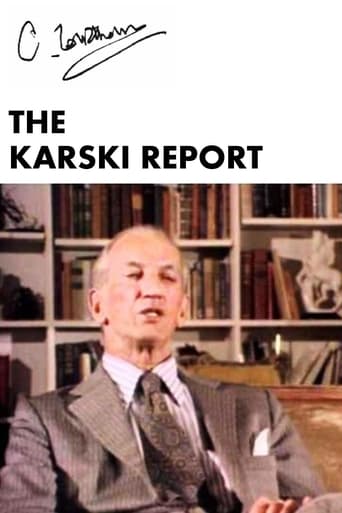Sindre Kaspersen
French professor, film editor and director Claude Lanzmann's documentary which he wrote, premiered on French television, was screened in the Homage section at the 63rd Berlin International Film Festival in 2013, was shot on locations in the United States and is a French production. It tells the story about a Polish-Jewish former resistance fighter, university teacher and reporter for the Government of the Republic of Poland in exile (1939-1990) named Jan Karski (1914-2000) and his experiences.Distinctly and subtly directed by French filmmaker Claude Lanzmann, this quietly paced documentary which is narrated mostly from the interviewees' point of view, draws a quite extraordinary portrayal of a Polish author. While notable for its atmospheric milieu depictions and distinct cinematography by French cinematographers William Lubtchansky and Caroline Champetier, this narrative-driven story reflects upon what happened when the interviewee thirty-five years before his multiple conversations with Claude Lanzmann encountered the 32nd president of the United States of America named Franklin D. Roosevelt (1882-1945) in the final stages of World War II.This historical testimony of real events which took place in the 1940s during the Second World War, which is set in the late 1970s in USA and which contains interviews conducted by the French filmmaker in the late 1970s which originally was intended to be used for another work which was released in the mid-1980s, is impelled and reinforced by its cogent narrative structure, subtle continuity and the remarkably efficient interviewing approach. An informatively multifaceted documentary.
Alex Deleon
Clayde Lanznan's "The Karski Report" turned out to be the single most compelling film experience of the entire Berlin 2013 festival week. I had read quite a bit about Karski and been fascinated by his incredible story, but had always wondered what it would be like to meet him in person – and there he was up on the screen larger than life. Jan Karski, a courier for the AK, the Underground Polish Army under German occupation, and a non- Jewish Polish observer of Nazi bestiality in Poland, was one of the unsung heroes of WW II -- unsung largely because his heroism fell on deaf ears when he emerged in England and the US to tell his story. Lanzmann conducted two days of interviews with Karski at his home in Washington DC in 1985, but only the first part was shown earlier in SHOAH. The fascinating second day, reedited in 2010, is the substance of this amazing film interview. What is amazing, of course, is the fact that Karski witnessed the ongoing atrocities with his own eyes, but nobody outside of Poland wanted to believe him, or thought his report on German brutality was so exaggerated that it was beyond belief and must be a fabrication. In the film we see Karski close-up, now a lean middle aged professor of political science with silver hair, pale blue eyes, and wearing a natty silver suit, seated in an armchair in his book lined study, as he reflects upon each question posed to him by Lanzmann, then answers fully in carefully considered detail. The most chilling part of the interview is the account of his meeting with FDR, president Roosevelt, for a half hour at the White House. He has been carefully coached by the Polish ambassador as to protocol and is told to be concise, unemotional, and to the point. Karski knows that the president is a cripple behind his desk, but he also sees him as a man who is totally aware of his gigantic influence as a shaper of world events, one of the most powerful men in the world – and one who expresses himself only in all-encompassing global terms.Karski opens with a description of what he saw in Warsaw and Belzic, but the president takes little note of it, only seeing it as a small part of a much larger problem. Roosevelt goes on and on about the need to defeat the Nazis and liberate Poland, but never makes any further reference to the mass murder of the Jews that Karski has mentioned. The next day Karski is introduced to Supreme court justice Felix Frankfurter, himself Jewish and one of Roosevelt's closest confidants. Frankfurter's reaction to Karski's story is that he "cannot believe it" – talk about stomach churning Holocaust denial at the highest levels imaginable – and here from a Jewish man who was in a position to actually do something about it – but chose not to – in the name of "higher considerations!The thing that makes this straightforward interview film so gripping is the steely unshakable presence of the man Jan Karski himself – reconstructing before our eyes moments of amazing intimate confrontation with the highest powers in the world and his absolutely cold recitation of the facts –nothing but the facts, as Sergeant Friday might put it … I left that screening with my head spinning and had a brief chat with a young German student who burst into tears as she acknowledged that her own grandfather might well have been one of the concentration camp killers. Claude Lanzmann, a French survivor of the WW II underground resistance, not of a concentration camp – has done more than make documentary films – he has literally made history by devoting a lifetime to making absolutely sure that this is all recorded for posterity. Had I only seen this one film my Berlinale 2013 would have been complete.
